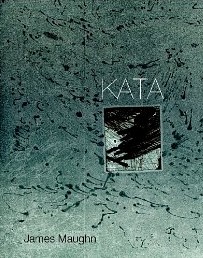Poetry of James Maughn
These Peripheries
In this new book,
These Peripheries,
Maughn wrote each poem in the book
in response to a poem by another poet:
|
The poems in
These Peripheries
represent engagements with poems from a variety of literary journals, books,
and anthologies between 2002 and 2010.
The poems were constructed by my writing a new line of poetry
that responds to, or plays off of, each line in the poem referenced
in the title. The poems are not intended to be translations or reworking
of the original poems, but rather something like ripples or echoes that exist,
somewhat tenuously, at the edges of other poems.
They are, in one sense, a form of reading.
|
The title of the first poem (p.7) is:
|
Following a selection from Sandra Moussempres' "Incantations (7)"
|
The title of the last poem (p.93) is:
|
Following Mercedes Cebrian's "Dangers of Imprecise Reading"
|
One of my favorites is his poem on p. 69 is based on a translation by J.P. Seaton:
Following Li Po's "Drinking in Mountains With a Hermit Friend"
the bottle makes a third
flower open
a pockmarked bird; one
more; surely we can do better?
lit out around dusk
should you happen to return
try to be music?
|
This is the J.P. Seaton translation, in Bright Moon, White Clouds (2012, p.37):
Drinking with a Hermit Friend in the Mountains
Together we drink: two mountain flowers, opening.
A cup, a cup, and then to begin again at the beginning, another cup!
I'm drunk, would sleep . . . you'd better go.
Tomorrow, come again, if you will, with your lute.
|
Looking at other translations of this poem helps see not only how much variety there is
(as one would expect) among translations,
but also the tremendous leap that Maughn has made in his engagement with this poem:
A translation from The Anchor Book of Chinese Poetry (2005),
edited by Tony Barnstone and Chou Ping:
Drinking Wine with the Hermit in the Mountain
We raise our cups where mountain flowers bloom.
One cup, another cup, and another cup.
I'm drunk and want to sleep. Leave me now.
Tomorrow, if you feel good, come with your lute.
James Cryer's
translation in Bright Moon, Perching Bird (1987, p.6):
On the mountain, with my hermit friend and wine
the two of us
and wine
as mountain flowers
open
one cup
one cup
and so on
drunk
I want to sleep
my friend
must go
tomorrow
if you wish
come back
but bring your lute!
A translation by François Cheng
in Chinese Poetic Writing (1977 in a 1982 translation by Donald A. Riggs and Jerome P. Seaton);
also, this book is the best (seen so far) for showing legible Chinese:
Drinking with a Friend, among the Mountain
Together we drink; the mountain flowers open.
A cup, a cup, and one more cup.
Drunk, I'd sleep; you go.
Tomorrow, come again: Do bring your lute.
|
As in his earlier
KATA,
poet James Maughn has created poems that transform experiences.
KATA
The poet James Maughn is a student of Karate and particularly of the movement sequences called
Katas.
The Katas teach ways of movement.
Maughn wrote each poem in the book
KATA
in response to one of the Kata movements that Maughn has studied.
The poems depict the energy and the ways of movement but they
are not descriptive of the Kata movements. Rather, Maughn says, they are about finding ways
in language to express that movement.
It is fascinating to attend a poetry reading by Maughn and hear him speak about his process.
His work is both responsive and tangential, both simple and iterative,
of fractured and overlaid images.
Here is his first poem:
Pinan
sho
really no other way how to walk
when you know
you've been all wrong doing it
breathing
the same
|
-
Links and Books.
-
[Thanks for visiting.]
 Highlights of Poetry.
Highlights of Poetry.
 Index of poetry.
Index of poetry.
 How to Write Poetry.
How to Write Poetry.
 Books read.
Books read.
 Haibun.
Haibun.
 Haiku.
Haiku.
 Hay(na)ku.
Hay(na)ku.
 Rengay.
Rengay.
 Tanka.
Tanka.
 Ballade.
Ballade.
 Concrete.
Concrete.
 Ghazal.
Ghazal.
 Lai.
Lai.
 Pantoum.
Pantoum.
 Prose poem.
Prose poem.
 Rondeau.
Rondeau.
 Rubáiyát.
Rubáiyát.
 Sestina.
Sestina.
 Skaldic verse.
Skaldic verse.
 Sonnet.
Sonnet.
 Terza rima.
Terza rima.
 Triolet.
Triolet.
 Tritina.
Tritina.
 Villanelle.
Villanelle.
 Bashō.
Bashō.
 Claire Gallagher.
Claire Gallagher.
 J. Zimmerman.
J. Zimmerman.
 J. Zimmerman (haiku).
J. Zimmerman (haiku).
 J. Zimmerman (tanka).
J. Zimmerman (tanka).
 Jane Hirshfield.
Jane Hirshfield.
 James Maughn.
James Maughn.
 Kay Ryan.
Kay Ryan.
 Kay Ryan's style.
Kay Ryan's style.
 Kay Ryan The Best Of It: New and Selected Poems.
Kay Ryan The Best Of It: New and Selected Poems.
 Marianna Monaco.
Marianna Monaco.
 Ouzel (James Arnold).
Ouzel (James Arnold).
 Patricia J. Machmiller.
Patricia J. Machmiller.
 Shiki.
Shiki.

